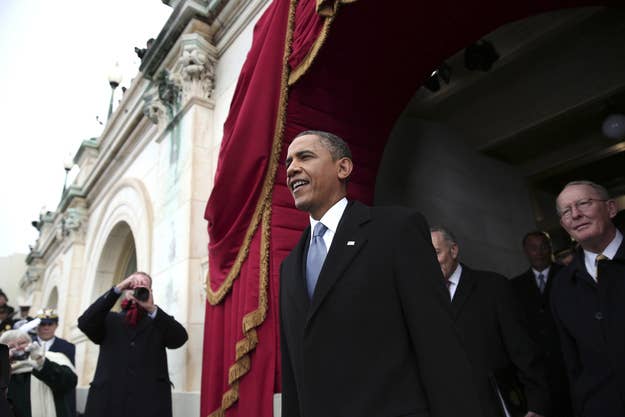
WASHINGTON — The White House has steadfastly refused to answer the question of whether President Barack Obama believes state measures like California's Proposition 8 are unconstitutional, even following the broad affirmation of LGBT equality made in his inaugural address and as pressure is rising for the administration to take action on Proposition 8 in the coming month.
For now, though, the White House has chosen to highlight two concepts — both of which are simply restatements of facts — as "answers" to questions leading in that direction.
First, Obama and the White House reiterate the historical fact that marriage has been defined at the state level; there is no federal marriage license. Although marriage is defined by state law, however, there are constitutional limits to how states can do so — as the Supreme Court has enforced regarding, for example, state laws banning interracial marriage. Second, White House officials note that the federal government is not a "party" in the Proposition 8 case.
Those facts are not incompatible with the unanswered question of whether Obama and his administration view Proposition 8 as unconstitutional and, accordingly, whether the administration will file an amicus curiae, or "friend of the court," brief in the case. Such briefs are not filed by parties to cases, but are rather filed by outside people or groups interested in the outcomes of cases.
The White House's refusal to answer the question was highlighted in Tuesday's White House press briefing, as NBC's Kristen Welker questioned Carney abut Obama's views following his inaugural address statement that "[o]ur journey is not complete until our gay brothers and sisters are treated like anyone else under the law — for if we are truly created equal, then surely the love we commit to one another must be equal as well."
The reference to the law led the vice president of the country's largest LGBT rights group, the Human Rights Campaign, to note about the Proposition 8 case Tuesday morning, "We view the President's filing of an amicus brief in this case as the next natural step to his Inaugural remarks."
Whether it is the "next natural step" remained unanswered in the briefing room later in the morning Tuesday. Welker noted Obama's past statements "that same-sex marriage is an issue that should be worked out at the state level" and, in reference to his inaugural remarks, asked, "Does this suggest that he now believes it's something that should be worked out at the federal level?"
Carney did not answer the question, instead noting everything else about Obama's views on same-sex couples' rights — from opposing "efforts to restrict the rights of Americans" and Section 3 of the Defense of Marriage Act to his belief in "the overall principle that we should not discriminate or treat differently LGBT Americans."
Welker followed up, asking, "But is it something that should be litigated at the federal level?" The question is important because in the two cases before the Supreme Court addressing questions of same-sex couples' marriage rights, the administration is and has been on the record about its position on DOMA but has, as noted, not taken a position on the Proposition 8 case.
Carney stumbled a bit when answering, saying, "Well, one of the reasons why we believe that DOMA, the Section 3 of DOMA, is not constitutional is because we shouldn't be litigating — should not be addressing it in that way." A White House official told BuzzFeed, "Jay was clearly speaking about DOMA," hence, not suggesting that the White House was taking any position on the Proposition 8 case or any other constitutional litigation challenging state marriage law restrictions.
When Welker followed up on that vague response by asking directly about Proposition 8, Carney said, "Well, as you know, the administration is not party to that case. And I have nothing more for you on it."
Restating the fact that administration is not a party to the Proposition 8 case is a non-answer as to whether the administration has a view on Proposition 8 being constitutional. Moreover, The Washington Post's Greg Sargent reports that an amicus brief is being "mulled" by Justice Department officials for filing in the Proposition 8 case.
The deadline for submitting amicus curiae briefs supporting the couples challenging Proposition 8 in the Supreme Court is Feb. 28. Amicus briefs supporting the Proposition 8 proponents or supporting neither side are due Jan. 29.
Following the lack of clarity from Tuesday's briefing, HRC followed up, with the group's president, Chad Griffin, saying in a statement, "In his inaugural address yesterday, President Barack Obama called for the equal protection of our nation's laws for gays and lesbians families. Now, as the United States Supreme Court prepares to hear a landmark marriage equality case on this same question, it seems only logical for the White House to take yet another important step toward fulfilling that promise of equality by filing an amicus brief in support of the plaintiffs in Hollingsworth v. Perry."
Even if the administration doesn't file an amicus brief in the Proposition 8 case, that's not the end of the issue.
The administration's Supreme Court lawyer, Solicitor General Donald Verrilli Jr., will be arguing about the administration's position on DOMA on March 27, the day after the oral arguments over the Proposition 8 case. Because of the administration's view expressed in the DOMA case that courts should view laws that classify based on sexual orientation skeptically, it is very likely that justices will ask Verrilli how accepting that argument would impact the challenge to Proposition 8.
Correction: The deadline for the amicus filings was originally incorrect in this article.
